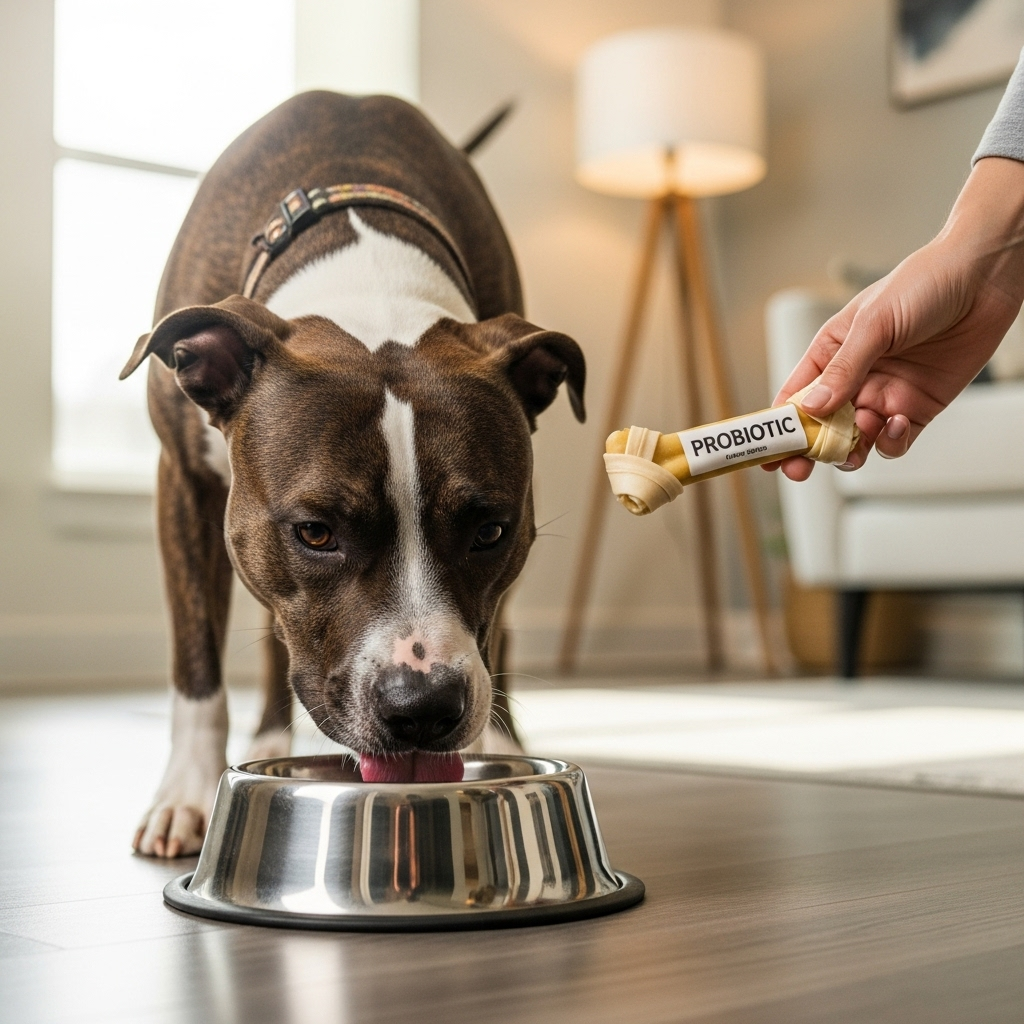Probiotics for Pitbulls: Gas & Loose Stool Support

If your Pitbull is experiencing gas, soft or loose stools, probiotics can be a useful, low-risk tool to help rebalance gut bacteria and support digestion. This guide explains how probiotics work, which strains are commonly used for dogs, how to choose and give them safely, and when you should contact your veterinarian.
Why Pitbulls Get Gas and Loose Stool
Loose stool and increased flatulence are common signs of digestive upset and can have many causes. Understanding the cause helps determine whether probiotics are appropriate:
- Diet changes or low-quality food that is hard to digest
- Food intolerance or food allergy
- Sudden introduction of new treats, table scraps, or rich foods
- Intestinal parasites, bacterial infections, or viral illness
- Antibiotic use that disrupts normal gut flora
- Stress, boarding, or travel
- Underlying medical conditions (pancreatic insufficiency, inflammatory bowel disease)
How Probiotics Help
Probiotics are live microorganisms that, when given in adequate amounts, may provide a health benefit by:
- Restoring a healthy balance of gut bacteria after disruption
- Improving digestion and nutrient absorption
- Reducing loose stool frequency and improving stool consistency
- Helping limit overgrowth of undesirable bacteria that can produce gas
- Supporting immune function in the gut lining
Common Probiotic Strains Used in Dogs
Some strains have more evidence in dogs and are commonly found in pet formulations:
- Lactobacillus acidophilus — supports digestion and can reduce diarrhea
- Lactobacillus rhamnosus — may reduce duration of diarrhea and support immunity
- Bifidobacterium animalis (including B. lactis) — often used for stool consistency
- Enterococcus faecium — commonly used in veterinary products for gut health
- Saccharomyces boulardii (a beneficial yeast) — useful with antibiotic-associated diarrhea
Choosing the Right Probiotic for Your Pitbull
When selecting a probiotic, consider these practical points:
- Choose formulas labeled for dogs or veterinary use — they account for species differences and dose.
- Look for specific strains and a guaranteed colony-forming unit (CFU) count at time of manufacture or expiration.
- Prefer multi-strain products backed by some clinical data in dogs, or single-strain products with research support (e.g., S. boulardii for antibiotic-associated diarrhea).
- Check storage requirements—some need refrigeration while others are shelf-stable.
- Consider product form: powders mixed with food, chews, capsules, or pastes. Choose what your Pitbull will reliably accept.
How to Give Probiotics Safely
Follow these steps to introduce a probiotic:
- Start with the manufacturer’s recommended dose for your dog’s weight.
- Introduce gradually—if your dog is sensitive, begin with half the dose for 3–4 days and then increase.
- Give at the same time each day, often with food to improve tolerability and survival of organisms through the stomach.
- If your dog is on antibiotics, give the probiotic a few hours apart from the antibiotic dose or ask your vet about timing; some vets recommend continuing probiotics during and after antibiotic therapy.
- Monitor stool consistency, frequency, appetite, and behavior for 5–14 days. Some dogs improve within a few days; others may need 3–4 weeks for clearer benefit.
When Probiotics May Not Be Enough
Probiotics are supportive, not a cure-all. Seek veterinary care right away if your Pitbull has any of the following:
- Profuse watery diarrhea or vomiting
- Blood in the stool or black, tarry stools
- Marked lethargy, fever, or signs of pain
- Weight loss, chronic diarrhea, or poor body condition
Your vet will evaluate for parasites, infections, dietary intolerance, pancreatic disease, or inflammatory bowel disease and recommend appropriate treatment.
Practical Tips to Reduce Gas and Loose Stool
- Make diet changes slowly over 7–10 days when switching foods.
- Feed a high-quality, easily digestible diet recommended by your veterinarian.
- Limit table scraps, fatty foods, and sudden dietary treats.
- Use slow-feeding bowls or puzzle feeders if your Pitbull eats quickly and swallows air.
- Keep up with deworming and fecal checks as recommended by your vet.
Pros and Cons of Using Probiotics for Pitbulls
| Pros | Cons |
|---|---|
| Can reduce frequency of loose stool and improve stool consistency | Not effective for all causes of diarrhea (e.g., parasites, severe disease) |
| Generally safe with few side effects | Quality varies between products; some lack clear strain information |
| May help during and after antibiotic use to restore flora | May cause mild bloating or gas temporarily in some dogs |
Monitoring and When to Reassess
Keep a simple stool log: note stool quality, frequency, and any vomiting or behavior changes. If you see no improvement after 10–14 days on a high-quality probiotic, or if symptoms worsen at any time, contact your veterinarian. Long-term or recurrent loose stool warrants diagnostic testing.
Short FAQ
Q: Are probiotics safe for Pitbulls?
A: Yes—most probiotics formulated for dogs are safe for healthy Pitbulls. Rarely, severely immunocompromised animals may be at risk; always check with your veterinarian for pets with serious health issues.
Q: How quickly will a probiotic help with loose stool?
A: Some dogs show improvement within 48–72 hours, but it can take 1–4 weeks for consistent benefit. If diarrhea is severe or persistent, seek veterinary care immediately.
Q: Can I give human probiotics to my Pitbull?
A: Some human probiotics may be safe, but doses and strains differ. It’s better to choose products labeled for dogs or to ask your vet which human products might be acceptable in a pinch.
Q: Should I stop probiotics if my dog is on antibiotics?
A: Not necessarily. Many vets recommend continuing probiotics during and after antibiotics to reduce antibiotic-associated diarrhea. Give the probiotic a few hours apart from the antibiotic or follow your vet’s guidance.
Key Takeaways
- Probiotics can help many Pitbulls with mild to moderate gas and loose stool by supporting healthy gut flora.
- Choose dog-specific products with listed strains and adequate CFUs; introduce gradually and monitor.
- Address other causes such as diet, parasites, or illness—probiotics are supportive, not diagnostic or curative for serious disease.
- Consult your veterinarian for persistent, bloody, or severe diarrhea, or if your dog is systemically unwell.
- Keep a stool log and follow veterinary guidance for dosing during antibiotic therapy or when underlying conditions exist.
Note: This information is intended for general guidance. Always follow your veterinarian’s specific recommendations for your pet.
Disclaimer: The content above is educational and does not replace personalized veterinary care. If your Pitbull shows severe symptoms, prolonged diarrhea, blood in stool, vomiting, lethargy, or any concerning signs, contact a veterinarian promptly for diagnosis and treatment recommendations.

Leave a Reply